
Whether it’s the Oscars, the Emmys, or the Webbys, everyone’s wished for the chance to be the one in the seat of honor — the one saying “I’d like to thank the Academy” or even the one who’s “honored just to be nominated.” So as the annual Brower Youth Awards came around this year, we dug deep with some capital-J Journalism to score you a virtual invite to the festivities.

What: Each year, the Earth Island Institute honors a group of youth activists for their leadership in conservation, preservation, and restoration. The Brower Youth Awards celebrate the work of the late environmental champion David Brower, who often served as a mentor for emerging young leaders. Punctuated by an awards ceremony in San Francisco tonight, this week saw the honorees spending their days in the Bay Area, taking a backcountry camping trip, working in a community garden, and riding along on a biodiesel-bus whistle-stop tour.
“I love the idea that they have us doing community service the week that we’re being recognized for the service that we’ve done in our communities at home,” said (Karoline) Evin McMullen, one of the six winners.
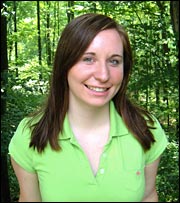
(Karoline) Evin McMullen.
Photos: Earth Island Institute
Who: Ranging in age from 16 to 22, this year’s honorees have been involved with projects that vary from educating teens about toxins in everyday products to protecting their communities from encroaching development.
McMullen, a 16-year-old from Chesterland, Ohio, cofounded Save Our Stream, a program partnering student and community groups with government agencies to clean up polluted streams and restore the habitat of threatened trout populations. She uses hands-on projects to teach kids at local public schools about science and get them outside, working together to preserve the environment.
Jessica Assaf, also 16, of San Rafael, Calif., is involved with the Safe Cosmetics Campaign, educating teens about the dangers of the potentially cancer-causing chemicals found in many brands of makeup. Assaf hopes her work will inspire both teens and adults nationwide to pursue legislation protecting public health.
Founder and student director of CYnergy Fellowship in El Paso, Texas, Ruben Vogt, 21, helps train high-schoolers to get involved in their communities, giving students a “toolbox of skills” like public speaking, strategic planning, and improved communication skills. The group aims to “eliminate Band-Aid solutions to problems,” he says, focusing instead on long-term solutions and creating a culture of change.
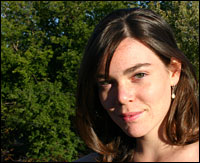
Elissa Smith.
Elissa Smith, 21, of Ottawa, Ontario, has worked to increase youth participation in environmental decision-making as an executive committee member of the Sierra Youth Coalition. Smith emphasizes that the future of the environmental movement will rely on “transcending traditional barriers and bringing together environmentalists, social-justice campaigners, and communities bearing the brunt of the impacts of climate change.”
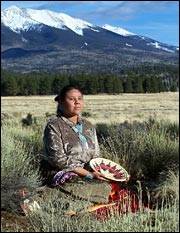
Alberta Nells.
A native of the sacred lands in the San Francisco Peaks of northern Arizona, 16-year-old Alberta Nells is active with Youth of the Peaks, a group of indigenous and non-indigenous youth working to protect the community’s cultural ways and local environment. For Nells, it’s more than an extracurricular interest: “I’m doing this for the people, the land, the spirit.”
May Boeve, 21, of Middlebury, Vt., helped coordinate the Road to Detroit tour, a 15,000-mile educational journey across the country last summer on a biodiesel-powered bus. The final destination? A visit to automakers to persuade them to invest in better fuel efficiency and zero-emissions technology.
When: The awards ceremony is tonight, but the work these youth are committed to doesn’t have an end in sight.

Jessica Assaf.
“I see myself continuing to teach people that if they do not like something about the world — whether it be the fact that there are possible carcinogens in personal-care products or something completely different — that it is their responsibility to work toward change,” Assaf says.
BYA winners receive a $3,000 cash award to continue their work, and they also gain access to new resources, mentors, and ongoing opportunities to fine-tune their leadership skills as they become part of the Earth Island Institute’s New Leaders Initiative.
“I want people to know that regardless of age, we must start now to sustain the world for future generations,” Assaf says. “We have all the resources and all the technology; all we need is people to initiate the use of environmentally safe products and practices.”
Where: This year’s honorees come from communities all over North America, but their work casts a much wider net.
Two of the six have focused their projects on their personal, local environments. Nells’ work aims to “build stronger communities for the coming generation,” while McMullen is focused on the protection of a species native to her hometown, the Ohio brook trout. But, McMullen says, “the message that it tries to get out — education and preservation are the two keys to really conserving the environment — have a national and worldwide applicability.”
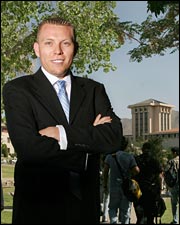
Ruben Vogt.
Vogt says his passion stems from the people of his hometown, but his experiences this week meeting fellow honorees have given him a better perspective on what’s happening on both national and international levels. “It brings us together, and we get to collectively share our ideas and see where we’re lacking and where, as a group, we can pick up the pace and get more things done,” he says.
And though Boeve’s work literally took her across the country, she’s finally off the road. For now, she says, she’ll be focusing on “national-level actions aimed at influencing Congress to adopt comprehensive legislation on climate change.”
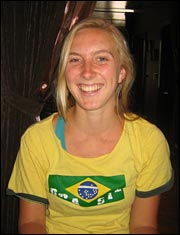
May Boeve.
How: Though their efforts range from education programs to scientific research, what unites these six youth is their willingness to take a leadership role. They’ve rallied communities and planned protests and lobbied for legislation. But most important, they’ve convinced their peers to join them in the fight.
“The energy choices we make today will determine the world my generation will inherit, which is why — across the globe — students and young people are leading efforts to build genuine, sustainable solutions to climate change,” Smith says.
And it’s a “vibrant, grassroots movement,” Boeve adds. “We’re mobilizing our campuses, we’re writing songs and creating art, and we’re lobbying our political leaders.”
Why: Quite simply, these six youth are passionate about what they do. And they know the involvement of their generation is the key to envisioning a clean and healthy future for everyone.
“We cannot just let frustrating environmental issues pass us by,” Assaf says. “We are the future, and we have all the tools for improvement. Everyone has the power to make change.”


